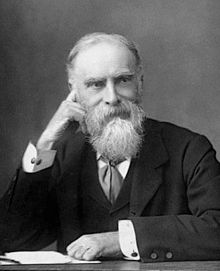Death of James Bryce (January 22, 1922)

British statesman and scholar Lord James Bryce was one of the main pro-Armenian forces in Great Britain during the 1870-1920 period.
He was born on May 10, 1838, in Belfast, Northern Ireland. He studied at the University of Glasgow and Trinity College, Oxford. He was professor of Civil Law at Oxford from 1870 to 1870 to 1893 and of Jurisprudence at Owens College, Manchester, from 1870 to 1875. He was elected member of Parliament in 1880 and then from 1885 to 1907. He later held various positions in public service, among them Under-Secretary of State for Foreign Affairs (1886), President of the Board of Trade (1894-1895), and Chief Secretary for Ireland (1905-1907). He was appointed British ambassador to the United States (1907-1913) and was well-known in America for his book The American Commonwealth (1888). He became a member of the Hague Tribunal in 1914.
The first visit of Bryce to historical Armenia was in 1876 to climb Mount Ararat, after which he published the book Transcaucasia and Ararat (1877), a narrative of travel notes with several political observations and conclusions. After his trip to Armenia, in 1878 Bryce established the Anglo-Armenian Association, with Lord Carnarvon as president and Bryce as secretary. In 1880 he traveled to historical Armenia for the second time, visiting also Smyrna and Constantinople.
In 1893, Bryce initiated the formation of the new Anglo-Armenian Association, presided by F. Stevenson, a member of the British Parliament.
The new rise of the philo-Armenian movement in Great Britain started after the Hamidian massacres of 1894-1896. Bryce joined other leading European statesmen and published his pro-Armenian articles in the British and American press. He published the fourth edition of Transcaucasia and Ararat in 1896 with a supplementary chapter entitled “Twenty Years of the Armenian Question.” In 1904, he participated actively in the international pro-Armenian movement, holding conferences and meetings in favor of the Armenians persecuted within the Ottoman Empire.
In 1915, he was one of the first to protest the policy of extermination of Armenians implemented by the Young Turk government. The British government gave him a mandate to prepare a file on the persecution and massacres of Armenians in Turkey. The compilation of documents The Treatment of the Armenians in the Ottoman Empire, 1915-1916, also known as the British Blue Book, prepared by young historian Arnold Toynbee, was published in 1916, edited and introduced by Bryce. It has been one of the most important sources on the Armenian Genocide. It mostly presented testimonies of eyewitnesses from Germany and neutral countries, as well as narratives of survivors.
Bryce also condemned the Kemalist policy. In February 1920, during his speech at the House of Lords, he blamed the Kemalists for unleashing new massacres of Armenians in Cilicia.
He passed away in Sidmout, England, on January 22, 1922.
